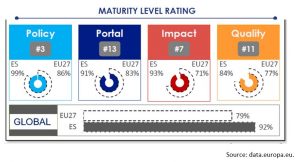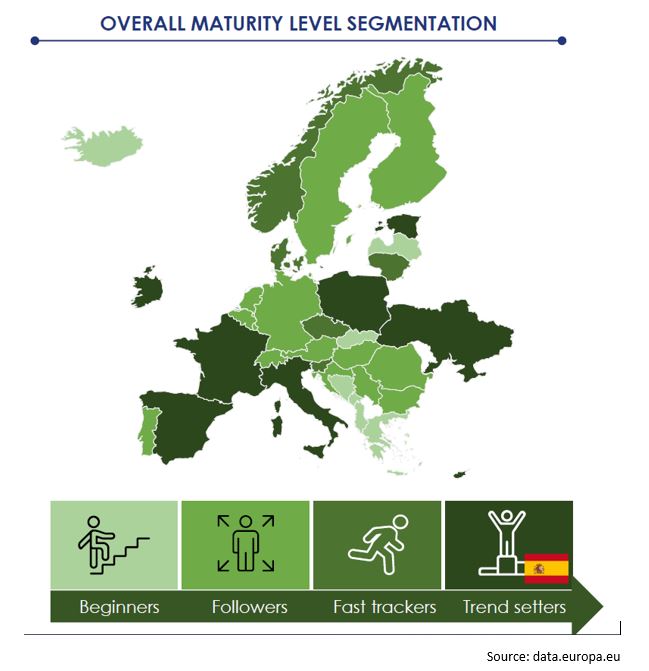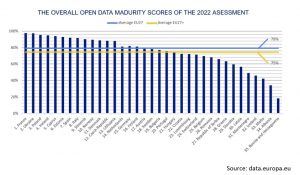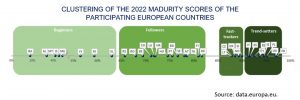Maturity of Open Data in the European Union: Where Is Spain?

Maturity of open data in the European Union: where is Spain?
- Spain is among the pioneers and trend setters in open data according to the latest report from the European Commission
- Maturity in data sharing is assessed based on analysis of a country's public policies, open data website, impact and data quality
The European Commission has published its 2022 report on Open Data Maturity and analyses it based on four aspects: policies, website, impact and data quality. Spain particularly excels in the policy section and is the seventh highest-rated country overall.
Measuring the impact, especially the economic impact, of open data and its reuse proves to be a major challenge for countries with a more mature data environment.
Spain, among the trend setters
Spain is among the countries that rank as pioneers and trend setters in open data, according to the European Commission's report. These are the countries that obtain an average of at least 91% of the maximum score across the different aspects studied. They include, in addition to Spain, France, Ukraine, Poland, Ireland, Cyprus, Estonia and Italy.
Spain, with a score of 92%, earned the seventh highest score. This acknowledges Spain as a country with an advanced policy in the field of open data and with strong coordination at different levels of government. Spain's open data portal offers a wide range of data of interest to advanced users, its quality is very good and it is bolstered by initiatives focused on the publication of high-value data. Methodologies for studying the use of open data and assessing its impact are also recognised.

Spain is highlighting its Digital Agenda with initiatives aimed at implementing the European directive on open data and the reuse of public sector information. Some of these include the implementation of a National Artificial Intelligence Strategy, the operation of the Data Office, promoting open data and interoperability in government administration, and efforts to identify business models and success stories based on data and data sharing.
Spain's digital strategy is aligned with the European Commission in prioritising the identification of high-value data, boosting the participation of the agents involved, strengthening the quality of meta-information, facilitating data reuse and improving the measurement of data impact. It does so by inviting the private sector to collaborate, organising competitions and working groups, conducting surveys and launching awareness-raising and training activities to promote a data culture.
The European Commission's recommendations for next steps
Spain, as one of the pioneers and trend setters, is mainly faced with the challenge of optimising the measurement and assessment of open data's impact on society, the environment and the economy.

The European Commission proposes a series of recommendations to the pioneering countries in order to maintain a mature ecosystem for data exchange, experimentation and knowledge sharing. These include:
- Developing thematic communities of data providers and users, with a particular focus on defined high-value categories: geospatial, earth and environmental observation, meteorology, statistics, companies and corporate ownership and mobility.
- Defining and implementing a strategy to ensure the sustainability of local and national open data portals.
- Fostering collaboration with national data teams, universities, research institutions and the official European data portal to develop an experimental framework for impact assessment.
- Promoting research to study the economic impact of open data.
- Harnessing the community's knowledge and promoting its contribution to national plans, and facilitating its sharing of data reuse and results on the national portal.
- Working to improve the quality of meta-information and data through the portal itself and investing in tools to help identify the needs of the open data user and characterise their profile while maintaining their privacy.
- Improving the visibility of public data, promoting the training and certification of advanced knowledge.
- Sharing knowledge and experimentation at an international level.
European maturity in data sharing
The average maturity in the European Union stood at 79% in 2022. The average of 80% (which indicates advanced progress) was surpassed in the "Policy" and "Portal" indicators, with 86% and 83% respectively.
In the report's conclusions, the European Commission highlights a number of common challenges such as the lack of human resources and expertise in the public sector; the limited availability of financial resources; problems of governance and coordination between different levels of government; difficulty in securing data sharing commitments; and the need for greater legal, technical and financial support to address high-value data.

Compared to 2021, the report points to a drop of two percentage points in European maturity. This is a common scenario; in Spain the drop was three points.
This drop is more pronounced in the "Impact" indicator, where ratings have been significantly restructured, thus complicating comparisons with previous years. In fact, this indicator has fallen by 7% on average among all countries and by 6% in Spain. The European Commission explains that the update of the indicator presents a more accurate picture of the difficulty of the challenge of assessing the impact. It now tries to integrate regional and local realities and pays more attention to measuring the impact of high-value data categories.
The open data maturity report
The European Commission analyses data sharing policies in a total of 35 countries. That is, all member states (27); four candidate countries (Albania, Montenegro, Serbia and Ukraine); Iceland, Norway and Switzerland, as members of the European Free Trade Association; and Bosnia and Herzegovina. Finally, it classifies them on a scale of four levels of maturity:

The report has been produced since 2015, although it is only in 2018 that it focuses on data quality, reuse and impact. Since then, it has been composed of the current four aspects and is carried out through questionnaires sent to national open data policy representatives.
You can find the key points of the report, the full study, the national factsheets and the answers to the questionnaires for each country on the official European data website.

